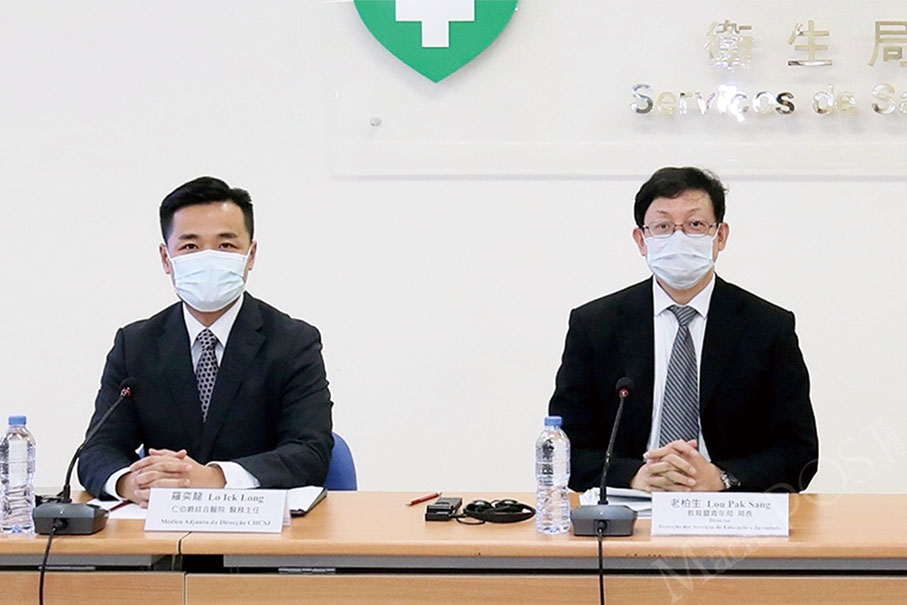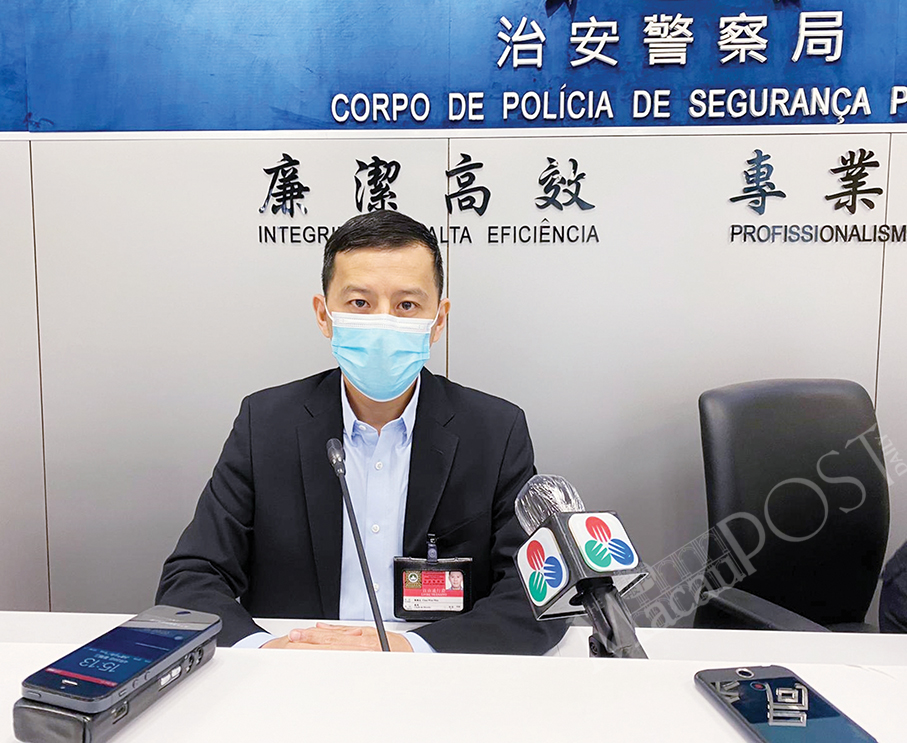Addressing yesterday’s daily press conference about Macau’s novel coronavirus (COVID-19) situation, Education and Youth Affairs Bureau (DSEJ) Director Lou Pak Sang announced that Form 4 to Form 6 classes in local schools will resume on May 4 and Form 1 to Form 3 pupils will return to school on May 11, while his bureau will later decide and announce the class resumption schedule for primary school pupils as well as special needs education and kindergarten pupils after assessing the development of the COVID-19 epidemic situation in Macau.
Lou was quick to add that his bureau does not rule out the possibility that kindergarten and special needs education pupils will not go back to school during the current school year.
Macau’s schools and kindergartens have been closed since the Chinese New Year holiday in late January in response to the COVID-19 epidemic. However, local schools – most of which are privately owned – have been conducting online learning sessions for their pupils since February.
Lou said yesterday that his bureau has maintained close communications with the Health Bureau (SSM), education associations and senior representatives from local schools for formulating preparatory plans for class resumption with pupils’ safety as the primary consideration over the past two months since classes were suspended. Lou said that his bureau and local schools have reached a consensus that classes should resume in phases with senior secondary school (F4 to F6) classes given priority for class resumption.
Lou said that after considering the current COVID-19 epidemic situation in Macau and listening to the “professional opinions” from the Health Bureau, his bureau has decided to resume senior secondary school (F4 to F6) classes on May 4 and junior secondary school (F1 to F3) classes on May 11. Lou said that his bureau will announce the schedule for the resumption of classes in primarily schools, kindergartens and special needs schools in due course, depending on the situation after the resumption of classes in secondary schools, and also depending on the changes in the COVID-19 epidemic situation in Macau.
Lou said that if “everything goes normal” after the resumption of classes in secondary schools, classes in primary schools, kindergartens and special needs schools could resume gradually.
Lou also said that his bureau would consider approaching the resumption of classes in kindergartens and special needs schools “in a more flexible way”, adding that his bureau did not rule not that those children will not return to school during the current school year.
Another schedule change ‘possible’
Lou underlined that his bureau might once again change the announced May 4 date for the resumption of classes in secondary schools due to a possible change in the epidemic situation, after referencing suggestions made by the Health Bureau.
Lou said that after class resumption, parents could apply for their children’s “reasonable absence” from school depending on the development of the epidemic situation and their children’s own particular needs, and schools should deal with such applications “in a flexible way”.
Lou also said that parents could apply for their young children to be looked after at school if no one could look after them at home while they are working. Lou said that if such an application is approved by the school, Primary 1 to Primary 3 pupils as well as kindergarten and special needs education pupils would be provided with a “limited” “look-after” arrangement, after the resumption of classes in junior secondary schools.
Macau’s basic education comprises 15 years – from K1 to F6, comprising different educational stages such as primary, junior secondary and senior secondary.
Lou said that his bureau has provided local schools with its class resumption guidelines such as on how they should carry out COVID-19 epidemic prevention measures, teaching and learning, assessments of their pupils as well as making decisions on whether to allow pupils to go up a grade. Lou said that his bureau will assist schools in carrying out a “drill” in line with the official class resumption guidelines, before the resumption of classes, so as to enable teachers and other staff to understand the details of the guidelines.
Lou said that if new COVID-19 cases are confirmed before or after class resumption, his bureau would discuss the matter with the Health Bureau and decide whether to suspend classes again for some or all educational stages, depending on the “nature” of the cases.
The Education and Youth Affairs Bureau said earlier this month that regardless of the scenario in which classes can resume later this year and will be running for a few months before the end of the current school year or the scenario in which classes cannot resume at all during the current school year, schools would definitely need to adjust the assessment methods for their pupils for the current school year because classes had already been suspended for about two months.
The bureau has underlined that if classes in local schools resume before the end of the current school year, classes could only run until July 31 at the latest – regardless of when classes resume.

‘Flexible’ assessment
Lou said yesterday that his bureau has finalised plans on how schools should evaluate their pupils’ performances for two scenarios after class resumption. In the first scenario in which there will still be adequate class time before the end of the current school year, schools should evaluate their pupils’ performances in a “flexible” way by combining the use of formative assessments – assessments that are constantly being carried out throughout a course – and summative assessments – namely final examinations, in which case the assessments should be carried out leniently rather than strictly, according to Lou.
Lou said that in the second scenario, in which there will only be a brief class time before the end of the current school year, or classes cannot resume at all during the current school year, it would not be suitable for schools to carry out summative assessments, in which case schools should allow all their pupils to go up one grade – regardless of the academic performance results they had obtained before the class suspension in late January.
Lou pointed out that as schools can extend their current school years to the end of July, there will be two months or so for secondary school pupils to study in their classes, adding that the two-month period would be sufficient for them to undergo a final examination. Lou said that the two-month period would be sufficient for schools to refresh their pupils’ knowledge on the lessons they had learnt during the current school year before the class suspension in late January. Lou said that his bureau was always urging schools that there is no need to rush their lessons, as pupils could always catch up on their lessons later throughout their school life, adding that schools could also choose to teach their pupils some of the new important knowledge that was initially slated to be taught during the current school year in the next school year.
Guangdong to resume classes next Monday
Lou also pointed out that the phased resumption of school classes in Guangdong will start on April 27, adding that this was one of the factors that his bureau has decided to set the start of the phased resumption of school classes in Macau on May 4.
May 4 is an important day in the nation’s history. The May Fourth Movement was an anti-imperialist, cultural, and political movement which grew out of student protests in Beijing on 4 May 1919. Lou said during yesterday’s press conference that the decision to restart Macau’s schools on May 4 had nothing to do with the history-laden importance of that day.
Lou also said that 13,248 senior secondary school pupils and 14,341 junior secondary school pupils are slated to return to school after their respective class resumptions on May 4 and 11.
3 more discharged
Meanwhile, Alvis Lo Iek Long, a clinical director of the public Conde de São Januário Hospital Centre, announced during yesterday’s press conference that three more COVID-19 patients were discharged from the public hospital yesterday, taking the number of those no longer requiring hospitalisation to 20 among Macau’s total of 45 COVID-19 cases.
Lo announced during Friday’s daily press conference that one COVID-19 patient was discharged from the public hospital on that day.
Following Friday and yesterday’s discharge of the four patients, a total of 25 COVID-19 patients remain hospitalised. Only one of the patients still in hospital had been in a serious condition for some time.
Lo said yesterday that the condition of Macau’s 18th patient, the only case which had been classified as “serious”, was further improving, adding that she was now no longer in a serious conditions. Consequently, none of the COVID-19 patients still under treatment are in a serious condition now.
Macau has so far confirmed 45 COVID-19 cases. The 10 patients (seven tourists from Wuhan and three locals) in Macau’s “first wave” of the COVID-19 infection – which lasted from January 22 to February 4 – have been discharged, while 10 of the 35 patients in the “second wave” – which began on March 15 – have been discharged since Easter Sunday. All the 35 cases in the current “second wave” have been classified as imported, most of them local students returning from overseas.
Macau has not confirmed a new COVID-19 case for 11 consecutive days in the “second wave” after the 45th case was confirmed on April 8.
According to Friday’s announcement, the patient discharged on that day is a 19-year-old local male resident who is studying in the United States. He returned to Macau from New York via Hong Kong last month with his mother, the patient whose condition had been classified as “serious”.
According to yesterday’s announcement, the three patients discharged yesterday comprise a 43-year-old local man who returned to Macau from Manila via Hong Kong last month, his nine-year-old daughter who returned to Macau with him and a 53-year-old local woman who returned to Macau from Lisbon via Hong Kong last month.
The four patients discharged on Friday and yesterday have been transferred to the Health Bureau’s Public Health Clinical Centre in Coloane yesterday for 14 days of recovery period isolation.








